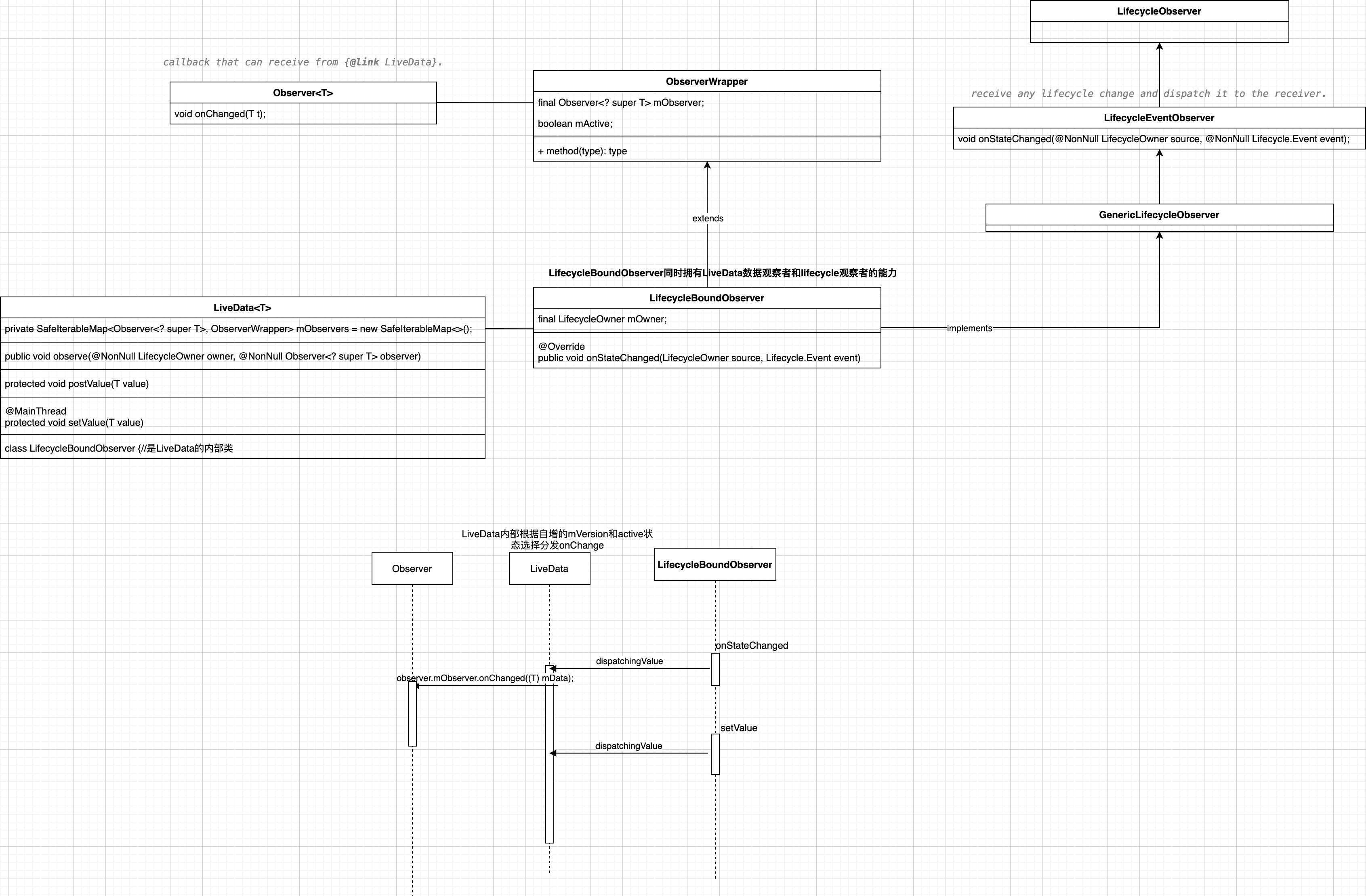LiveData
类设计

androidx.lifecycle:lifecycle-livedata:2.0.0
androidx.lifecycle:lifecycle-livedata-core:2.0.0
observe
private SafeIterableMap<Observer<? super T>, ObserverWrapper> mObservers =
new SafeIterableMap<>();
observe
@MainThread
public void observe(@NonNull LifecycleOwner owner, @NonNull Observer<? super T> observer) {
assertMainThread("observe");
if (owner.getLifecycle().getCurrentState() == DESTROYED) {
// ignore
return;
}
LifecycleBoundObserver wrapper = new LifecycleBoundObserver(owner, observer);
ObserverWrapper existing = mObservers.putIfAbsent(observer, wrapper);
if (existing != null && !existing.isAttachedTo(owner)) {
throw new IllegalArgumentException("Cannot add the same observer"
+ " with different lifecycles");
}
if (existing != null) {
return;
}
owner.getLifecycle().addObserver(wrapper);
}
LifecycleBoundObserver
class LifecycleBoundObserver extends ObserverWrapper implements LifecycleEventObserver {
final LifecycleOwner mOwner;
@Override
boolean shouldBeActive() {
return mOwner.getLifecycle().getCurrentState().isAtLeast(STARTED);
}
@Override
public void onStateChanged(@NonNull LifecycleOwner source,
@NonNull Lifecycle.Event event) {
if (mOwner.getLifecycle().getCurrentState() == DESTROYED) {
removeObserver(mObserver);
return;
}
activeStateChanged(shouldBeActive());
}
observeForever
@MainThread
public void observeForever(@NonNull Observer<? super T> observer) {
assertMainThread("observeForever");
AlwaysActiveObserver wrapper = new AlwaysActiveObserver(observer);
ObserverWrapper existing = mObservers.putIfAbsent(observer, wrapper);
if (existing instanceof LiveData.LifecycleBoundObserver) {
throw new IllegalArgumentException("Cannot add the same observer"
+ " with different lifecycles");
}
if (existing != null) {
return;
}
wrapper.activeStateChanged(true);
}
AlwaysActiveObserver
private class AlwaysActiveObserver extends ObserverWrapper {
@Override
boolean shouldBeActive() {
return true;
}
}
updateValue
postValue
protected void postValue(T value) {
boolean postTask;
synchronized (mDataLock) {
postTask = mPendingData == NOT_SET;
mPendingData = value;
}
if (!postTask) {
return;
}
ArchTaskExecutor.getInstance().postToMainThread(mPostValueRunnable);
}
private final Runnable mPostValueRunnable = new Runnable() {
@Override
public void run() {
Object newValue;
synchronized (mDataLock) {
newValue = mPendingData;
mPendingData = NOT_SET;
}
//noinspection unchecked
setValue((T) newValue);
}
};
setValue
@MainThread
protected void setValue(T value) {
assertMainThread("setValue");
mVersion++;
mData = value;
dispatchingValue(null);//null标识通知mObservers中的所有Observer
}
LifecycleBoundObserver.onStateChanged
@Override
public void onStateChanged(LifecycleOwner source, Lifecycle.Event event) {
if (mOwner.getLifecycle().getCurrentState() == DESTROYED) {
removeObserver(mObserver);
return;
}
activeStateChanged(shouldBeActive());
}
ObserverWrapper.activeStateChanged
void activeStateChanged(boolean newActive) {
if (newActive == mActive) {
return;
}
//仅在active状态发生变化时才继续流程
// immediately set active state, so we'd never dispatch anything to inactive owner
mActive = newActive;
boolean wasInactive = LiveData.this.mActiveCount == 0;
LiveData.this.mActiveCount += mActive ? 1 : -1;
if (wasInactive && mActive) {
onActive();
}
if (LiveData.this.mActiveCount == 0 && !mActive) {
onInactive();
}
if (mActive) {//仅仅在active时才dispatchValue
dispatchingValue(this);//通知当前observer
}
}
dispatchingValue
//如果传递了参数ObserverWrapper,则对其considerNotify,否则对mObservers中的item进行considerNotify
void dispatchingValue(@Nullable ObserverWrapper initiator) {
if (mDispatchingValue) {
mDispatchInvalidated = true;
return;
}
mDispatchingValue = true;
do {
mDispatchInvalidated = false;
if (initiator != null) {
considerNotify(initiator);
initiator = null;
} else {
for (Iterator<Map.Entry<Observer<? super T>, ObserverWrapper>> iterator =
mObservers.iteratorWithAdditions(); iterator.hasNext(); ) {
considerNotify(iterator.next().getValue());
if (mDispatchInvalidated) {
break;
}
}
}
} while (mDispatchInvalidated);
mDispatchingValue = false;
}
considerNotify
private void considerNotify(ObserverWrapper observer) {
if (!observer.mActive) {
return;
}
// Check latest state b4 dispatch. Maybe it changed state but we didn't get the event yet.
//
// we still first check observer.active to keep it as the entrance for events. So even if
// the observer moved to an active state, if we've not received that event, we better not
// notify for a more predictable notification order.
if (!observer.shouldBeActive()) {
observer.activeStateChanged(false);
return;
}
if (observer.mLastVersion >= mVersion) {
return;
}
//only when mVersion > observer.mLastVersion
observer.mLastVersion = mVersion;
//noinspection unchecked
observer.mObserver.onChanged((T) mData);
}
LifecycleBoundObserver.shouldBeActive
@Override
boolean shouldBeActive() {
return mOwner.getLifecycle().getCurrentState().isAtLeast(STARTED);
}